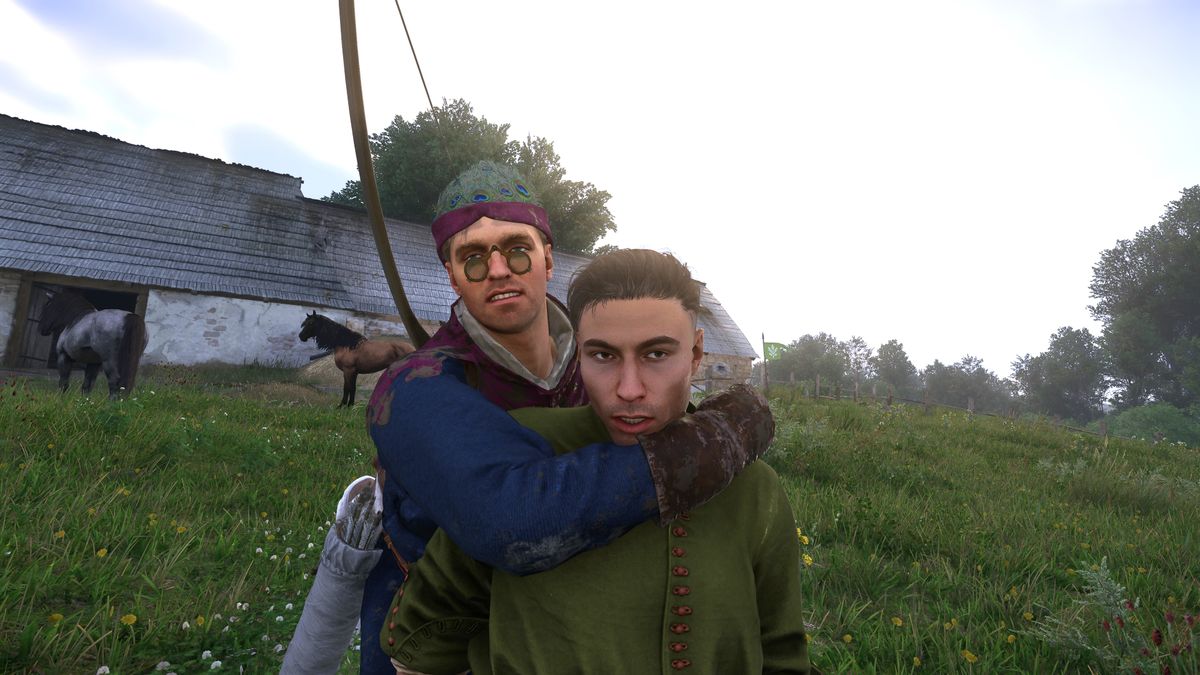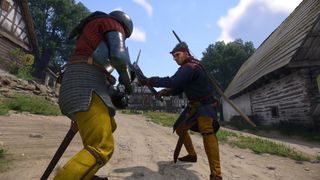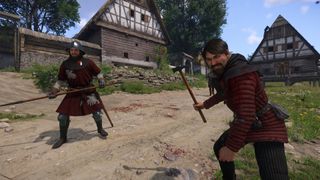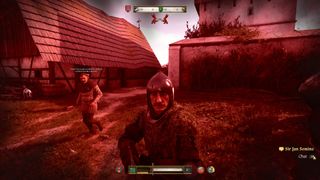After five hours, Kingdom Come: Deliverance 2 is a beautiful and blundering Boy's Day Out in Historyland
Check out the arse on that open world!
Kingdom Come: Deliverance 2 continues the misadventures of Henry of Skalitz, 15th century Bohemian blacksmith's son and chivalric Laddy Lad, who is questing to reclaim his murdered father's sword from some absolute shit of a noble. The prologue starts you off as the handsomely equipped and fully levelled-up bodyguard of Sir Hans Capon - an exasperating gadabout and your bosom chum from the 2018 game. You're on your way to deliver a message to a distant lord, in hopes that he'll take your own lord's side in the on-going civil war. But Plot intervenes in the shape of some suspiciously familiar bandits, who slaughter your retinue and reduce Henry and Sir Hans to a pair of shirtless runaways.
In the process, Henry gets shot full of arrows and loses all of his progression points along with his endgame armour and weaponry, while undergoing a series of embedded, narrativised tutorials and woozy flashbacks that fill you in on the events of the original Deliverance. A few hours later, he wakes up on a bed that isn't his, crusted with blood and filth. It's very much the first 24 hours of the stereotypical British stag party. All it's missing is a tattoo somewhere awkward and a traffic cone full of sick.
Things continue to go sideways - as regards my savegame, at least. Henry and Sir Hans head to a hilltop castle but aren't allowed in, because nobody recognises Sir Hans when he is dressed in burlap lifted from a corpse. Then they get locked in the stocks after Sir Hans picks a fight in a tavern - again, because nobody recognises Sir Hans when he looks like a haybale rolled through a cesspit. The stag party energy is definitely wearing thin, at this point. It suggests the more grown-up kind of British stag do, when everybody secretly hates being there but feels like they have to maintain standards. Waheeey, bois, amirite? Waheey! Ah, I remember this bar. It used to be a Woolworths, and you could get a double Milky Bar for 30p. Comrades, gentlebros, I'm feeling a bit sad, actually. Can't we just go back to the Airbnb and watch Friends?
Finally, Henry and Sir Hans have a massive tiff about Sir Hans's tendency to punch people who fail to acknowledge his station, which causes Sir Hans to storm off like the insufferable blueblood loser he definitely is. Henry is left standing by the stocks on a bright summer morning, penniless and triumphantly masterless - and it's time, at last for Kingdom Come: Deliverance 2 to begin. How will you rise from this dire predicament? What species of Henry will you be? A wandering thief? A silver-tongued scholar? A skilled swordsman? A good Christian? A womanising gambler? An unpredictable bum in jester's slippers?
The answer, probably, is all of this and more, depending on the situation or task at hand. Deliverance 2 is once again a freeform open world historical RPG that bustles with systems and practises social mobility like few others, though you're fundamentally beholden to your upgradeable character stats. Among its new features is the ability to switch between three clothing loadouts at whim. This is the basis, I hope, for such chameleonic shenanigans as kicking guards while draped in sackcloth, then transmogrifying into full plate armour like Superman emerging from a phonebooth.
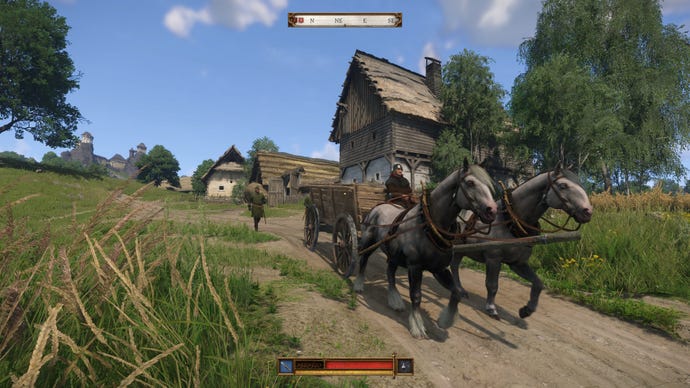
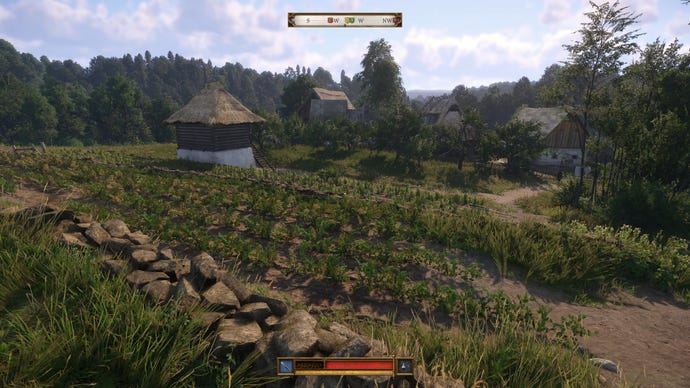
Image credit: Deep Silver / Rock Paper Shotgun
Right now, though, after five hours of play, my Henry is a homely and peaceable flowerpicker. He and I have long since forgotten about reconciling with Sir Hans, let alone avenging Henry's dad. We amble together through the undergrowth of the "Bohemian Paradise" region, running our eyes over festive banks of roots and following the giggle of water to the glitter of hidden brooks. We go fumbling after clumps of eyebright and belladonna amid dreamy spokes of forest light, identifying plants by stem, leaf shape and colour based on a lovingly illustrated herbarium.
We pause, now and then, to wonder whether we should experiment with eating a herb to figure out its properties, or seek the opinion of an apothecary. Ah, but that would mean heading into town, which might involve meeting that oaf Sir Hans again, and it's so
nice under the canopy, amirite lads? So calming. Henry does get peckish occasionally, but as luck would have it, there are lots of cabbage fields on the edge of this particular woodland. There's also the occasional bandit who murders us instantly - as in the original game, wearing the right combinations of armour really counts for a lot, and a difference in gear quality is audible in the clatter of blade on plate. But hostiles are easily evaded, when you're already roaming the undergrowth: just look for the investigating rabbit icon atop the HUD.
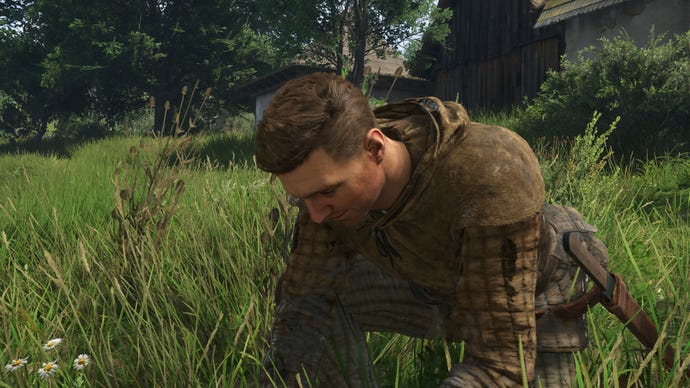
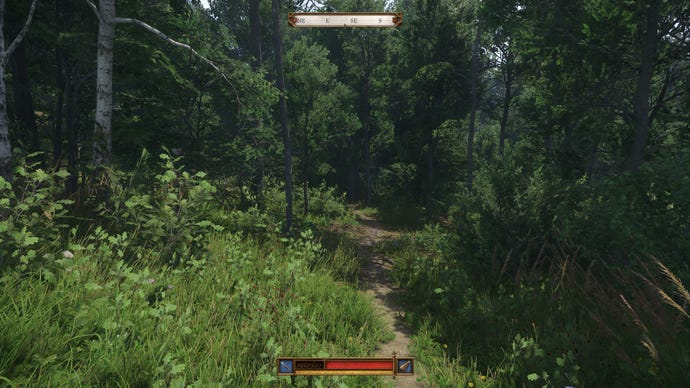
Image credit: Deep Silver / Rock Paper Shotgun
Deliverance 2's interface design is generally quite restrained and elegant. Menus are a bit stodgy, perhaps: they're rendered in swathes of soft leather, ornamental calligraphy and woodwork, and the insistence on materiality also (seemingly) obliges the developers to simulate the friction of shuffling bits of cloth and wood around. The map screen is a painted wartable hung with starchy paper clouds, and the codex beetles o'er with trivia about the Middle Ages.
There are some familiar HUD fixtures in the shape of a horizontal compass with quest waypoints, together with an indispensable stance indicator around your cursor during combat. As in the first game, you'll need to angle your weapon to intercept attacks, and learning to read the NPC animations beneath the iconography takes practice. But the game is careful not to overwrite its own geography to the point that the geography feels cosmetic. You have to stoop close to the ground to trigger the pop-up for a collectible herb, for example, which means you must recognise it first.
Sir Hans and his antics aside, sticking to the woods like this means that I am avoiding the detail of Kingdom Come: Deliverance 2's period setting, though I guess my expanding taxonomy of herbs is of a piece with Andreas Inderwildi's
analysis of the 2018 game's representational politics. My haphazard foraging is arguably part of what Andreas called a tendency to view history as "an accumulation of facts", both comparable to and actively performed by the accumulation of gear and loot in an Elder Scrolls-style RPG.
As he goes on in that piece, the "realist" idea of history as a puzzle to be solved, a lost unity to be inventoried, does not, in fact, give a reliable measure of a medieval 'world' that consists of scattered and eroded documents, competing perspectives, and accidental or deliberate misinformation. Indeed, the quantitative bookishness of such historical recreation may only disguise or sanitise the choices that go into, say,
the presentation of other ethnicities as murderous invaders.
I'm far too early in my Kingdom Come: Deliverance 2 career to offer any kind of comprehensive appraisal here. My Henry doesn't even have shoes right now. He hasn't had a bath since the bandit attacks, which is another reason he doesn't go into villages much - as in the original game, you can douse your face and garments at horse troughs, but if you want to impress anybody halfway noble and pass the associated conversational skill checks, you'll want to be appropriately perfumed. But so far, Deliverance 2's ideas about history as a practice and 15th century Bohemia specifically feel in keeping with the first game.
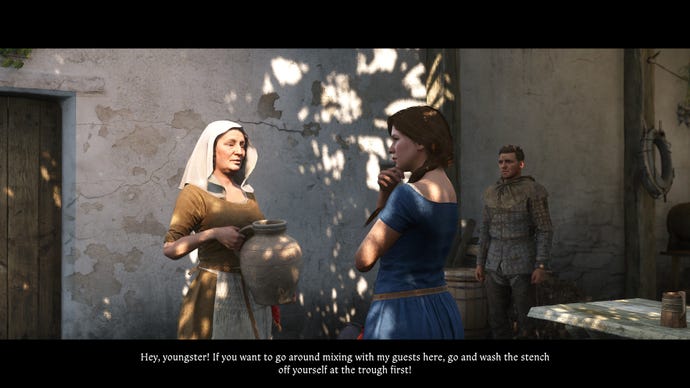
Image credit: Deep Silver / Rock Paper Shotgun
In particular, it settles happily into the concept of a medieval society in which women are ornaments, bystanders, forgiving confidants, and objects of lust. The first time you see a woman in Deliverance 2's world, beyond the intro cinematics, it's as part of an Ovidian stealth tutorial where you and Hans sneak up on some bathers. The first female character you have an actual conversation with is a healer; the second is the healer's daughter, who promptly launches into the role of Henry's bedside therapist.
I don't think this is all there is to Deliverance 2's depictions of women - I've had some relatively non-lecherous chats with at least three, one of them admittedly a brothel owner - but the framework we are working with here is very much Boys Will Be Boys and Oh You (Hands On Hips). I'm interested to discover whether this will change. Deliverance 2's opening is dominated by the chemistry between Henry and Sir Hans, with Sir Hans serving as the unapologetic piece of shit who both enables Henry's boorishness and makes you feel better because you're not
that bad. But there are traces of something more engaging there.
In the first game, Henry's relatively humble birth was a core plot theme, in ways familiar from many medieval romance fictions. This continues in Deliverance 2: stag party energy aside, the opening bust-up with Sir Hans is a playable commentary on how dress and appearance are more important than the colour of your blood.
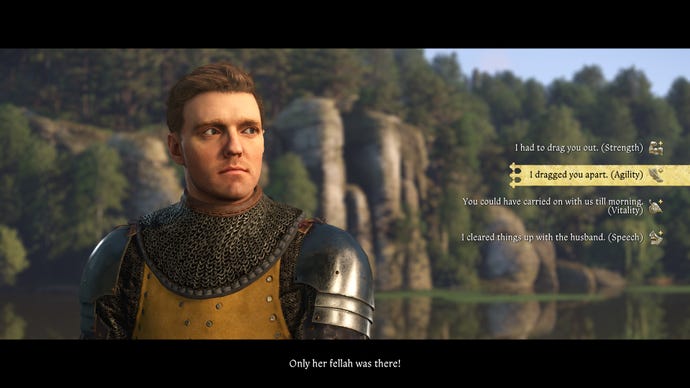
Image credit: Deep Silver / Rock Paper Shotgun
At one point, Sir Hans grandly outlines the divinely ordained distinction between the peasantry, nobility and clergy, only to stumble over the question of which category Henry belongs to, exactly. Perhaps it's just the usual ludonarrative dissonance at play, but I like the idea of a historical fable that is about figuring out the class associations of a character who is "classless" in the RPG sense, able to slip between roles as the occasion demands.
With Sir Hans out of the picture, perhaps I can reinvent Henry as some kind of unbearably precocious proto-feminist. It'll mean I have to stop poisoning him with random forest mushrooms, of course, but I'm willing to make that sacrifice. Anyway, look out for my full review of Kingdom Come: Deliverance 2 in a handful of weeks.
























